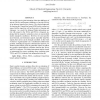Free Online Productivity Tools
i2Speak
i2Symbol
i2OCR
iTex2Img
iWeb2Print
iWeb2Shot
i2Type
iPdf2Split
iPdf2Merge
i2Bopomofo
i2Arabic
i2Style
i2Image
i2PDF
iLatex2Rtf
Sci2ools
ICASSP
2010
IEEE
2010
IEEE
A signal-specific bound for joint tdoa and FDOA estimation and its Use in combining multiple segments
We consider passive joint estimation of the time-difference of arrival (TDOA) and frequency-difference of arrival (FDOA) of an unknown signal at two sensors. The classical approach for deriving the Cram´er-Rao bound (CRB) in this context assumes that the signal (as well as the noise) is Gaussian and stationary. As a result, the obtained Fisher information matrix with respect to the TDOA and FDOA is diagonal, implying that the respective estimation errors are uncorrelated (under asymptotic conditions). However, for some speci c (non-Gaussian, non-stationary) signals, especially chirp-like signals, these errors can be strongly correlated. In this work we derive a “signal-speci c” (or a “conditional”) CRB for this problem: Modeling the signal as a deterministic unknown, we obtain a bound which, given any particular signal, can re ect the possible signal-induced correlation between the TDOA and FDOA estimates. We further demonstrate that this bound is instrumental for proper weig...
| Added | 25 Jan 2011 |
| Updated | 25 Jan 2011 |
| Type | Journal |
| Year | 2010 |
| Where | ICASSP |
| Authors | Arie Yeredor |
Comments (0)

